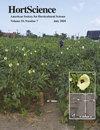Raising Mowing Height Improves Freeze Tolerance of Putting Green–type Bermudagrass
IF 1.5
3区 农林科学
Q2 HORTICULTURE
引用次数: 0
Abstract
There is a growing trend of cultivating hybrid bermudagrass [ Cynodon dactylon (L.) Pers. × Cynodon transvaalensis Burtt-Davy] on golf course putting greens in the transition zone because of its excellent quality in the summer months, coupled with less pesticide input than creeping bentgrass ( Agrostis stolonifera L.). However, the long-term success of bermudagrass putting greens is hindered by low temperatures in winter months, particularly in the transition zone. To address this issue, in addition to genetic improvement for cold hardiness through the development of new cultivars, effective management approaches are necessary to enhance the winter survival of putting green–type bermudagrass. The objective of this study was to investigate the relative freeze tolerance of four bermudagrasses and the effects of raising mowing height on the freeze tolerance of putting green–type bermudagrasses. In this study, two experimental putting green–type bermudagrasses (11X2 and OKC0805) along with cultivars TifEagle and OKC3920 were tested at two mowing heights (3.2 vs. 6.4 mm) at freeze temperatures that ranged between –4 and –11 °C. The lethal temperature to kill 50% of the population (LT 50 ) as well as regrowth vigor during recovery were evaluated. Variety ‘OKC3920’ demonstrated enhanced freeze tolerance compared with ‘TifEagle’ at both mowing heights. Increasing the mowing height from 3.2 mm to 6.4 mm improved freeze tolerance for most genotypes tested in this study. After exposing the grasses to –8 °C for 1 hour, genotypes such as 11X2 exhibited better regrowth vigor and demonstrated a faster recovery. This study suggests that golf course managers can enhance winter resilience of bermudagrass putting greens by selecting genotypes strategically with superior freeze tolerance and raising mowing heights in the fall acclimation process.提高刈割高度可提高绿型百慕草的抗冻性
杂交百慕大草[Cynodon dactylon (L.)]的种植呈增长趋势。珀耳斯。× Cynodon transvaalensis Burtt-Davy]在高尔夫球场将果岭放置在过渡区,因为它在夏季的品质优异,加上农药投入比匍匐弯草(Agrostis stolonifera L.)少。然而,百慕草推杆果岭的长期成功受到冬季低温的阻碍,特别是在过渡区。为了解决这一问题,除了通过选育新品种进行抗寒性遗传改良外,还需要采取有效的管理措施来提高绿型百慕大草的冬季成活率。研究了四种绿型百慕草的相对抗冻性,以及提高刈割高度对绿型百慕草抗冻性的影响。在本研究中,在-4 ~ -11°C的冻结温度下,对两种试验种植的绿型绿草(11X2和OKC0805)以及栽培品种TifEagle和OKC3920进行了两种刈割高度(3.2 vs. 6.4 mm)的试验。测定了50%种群的致死温度(l50)和恢复期的再生活力。与“TifEagle”相比,品种“OKC3920”在两个刈割高度上都表现出更高的抗冻能力。将刈割高度从3.2 mm增加到6.4 mm,本研究中大多数基因型的耐寒性都得到了提高。11X2等基因型在-8℃下处理1小时后,表现出较好的再生活力和较快的恢复速度。本研究表明,在秋季驯化过程中,高尔夫球场管理者可以通过战略性地选择耐寒性强的基因型和提高刈割高度来提高百慕大草推杆果岭的冬季适应力。
本文章由计算机程序翻译,如有差异,请以英文原文为准。
求助全文
约1分钟内获得全文
求助全文
来源期刊

Hortscience
农林科学-园艺
CiteScore
3.00
自引率
10.50%
发文量
224
审稿时长
3 months
期刊介绍:
HortScience publishes horticultural information of interest to a broad array of horticulturists. Its goals are to apprise horticultural scientists and others interested in horticulture of scientific and industry developments and of significant research, education, or extension findings or methods.
 求助内容:
求助内容: 应助结果提醒方式:
应助结果提醒方式:


